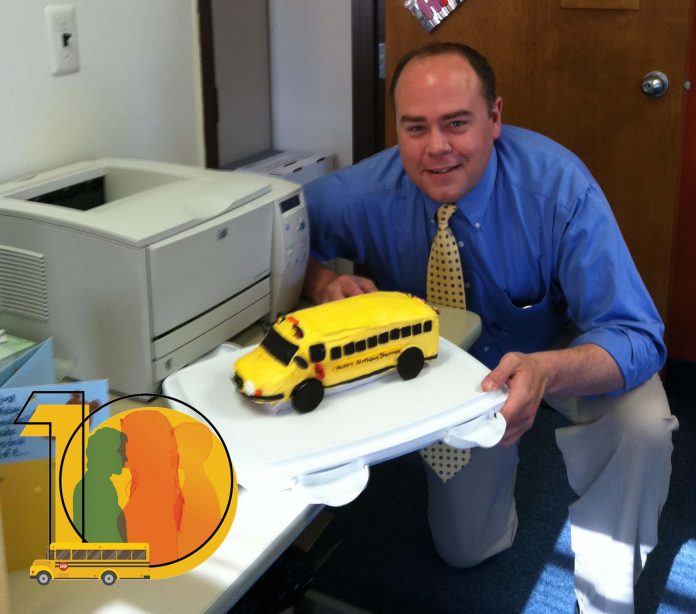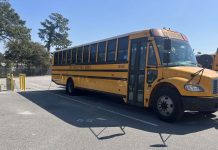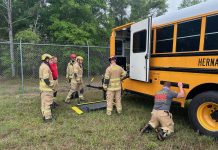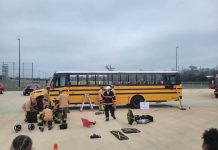Shannon Wilson, an 18-year veteran of school transportation, discussed that while there have been many changes to school transportation over the years, the effects of COVID-19 are the most he’s dealt with. His goal this school year is to simply stay afloat.
Wilson grew up in Spotswood, New Jersey, a small town located 40 miles southwest of New York City. After a brief move to the Big Apple, he found himself back in New Jersey living with a friend who was a school bus driver.
Wilson knew he qualified to be a bus driver as well and in July 2002 he started his career in pupil transportation at Laidlaw Transit. From there, he worked for various school districts, including Monroe Township Schools, where he worked with then transportation director Ingrid Reitano, who brought him into the transportation office to do purchase orders and help with dispatching and routing.
Reitano also encouraged Wilson to take the original New Jersey Student transportation courses. In August 2009, Wilson became the transportation supervisor of Jefferson Township Schools until 2017, when he briefly worked at Morris Hills Regional.
Now, Wilson serves as the director of transportation for Sussex County Regional Cooperative, a coordinated transportation service agency, or CTSA, in New Jersey, which he had been doing since 2018. Wilson explained that a CTSA is essentially an extension of a district’s transportation office, and all the transportation coordination that a district does not have the staff to manage gets sent to Wilson and his team.
The New Jersey Department of Education (NJDOE) recommends school districts provide out of district transportation through a CTSA, since the number of students attending a specific out-of-district school is usually fewer than the number of students attending a school within a district. According to the NJDOE, using coordinated or regionalized transportation services will likely result in a higher capacity of school buses, as they transport students out of the district school. One route could service several districts, whose students attend the same out of district school, Wilson explained.
“We charge them a small administration fee on top of the charge from the contractor invoice for the process of transportation bids, contracts, negotiating with contractors and management, coordinating shared routes, etc.,” Wilson explained. “The district saves money on sharing the route costs with other surrounding districts but also saves in being able to have less staff in-house to manage their transportation, and so much more. We also coordinate in-district transportation coordination to public schools and coordinate field and athletic trips. Additionally, I will go out and assist districts in completing their state reports or speak with their boards of education when requested.”
Currently, Sussex County Regional Cooperative coordinates transportation for 75 school districts and works with around 93 different contractors.
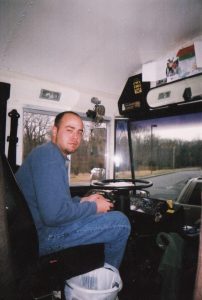
With 18 years in the industry, Wilson said he has seen many changes in school bus technology, including stop-arm cameras, interior and exterior cameras, GPS, three-point seatbelts, and student tracking applications.
One of Wilson’s greatest accomplishments, he said, was starting a stop-arm camera program in his former district, Jefferson Township Schools in Morris County, where the board of education and the police department worked hand-in-hand. He also implemented a school bus safety program that he shared with surrounding districts.
He added that he enjoyed watching how districts would craft the program to their needs, and in return, it received rave reviews from parents and the surrounding community.
Wilson has also been involved in the School Transportation Supervisors of New Jersey for many years. He started working on committees, then became a northern director. Now he serves as the Treasurer of the organization.
Impact of COVID-19
Despite the technological changes, Wilson said he believes the industry’s reaction to the pandemic is one of its greatest accomplishments.
“Navigating the pandemic and deciding on what Centers for Disease Control and Prevention guidelines are practicable and advising and working with the districts on strategies that fit the needs of the individual district,” Wilson explained.
He said as a CTSA right now, it’s a matter of staying afloat. He said the COVID-19 virus has caused a huge loss in revenue for his nonprofit, Sussex County Regional Cooperative. He explained that currently there are fewer students being transported, and those that are being transported are attending in-person classes less than five days a week.
Before COVID-19, he said the typical school year transportation budget was $36 million. He said proceeds from their administration fees, which ranges from two to four percent, would go to employee payroll, pensions, healthcare and other office expenses.
“We are not allowed or supposed to make a profit and not supposed to run in a deficit, so any profit we do get we re-invest in providing training for the contractors or use it to replace our own vehicles that we use to service our local districts providing them transportation at cost,” Wilson said.
He added that while a majority of their work is contracted out to vendors, they do run about 20 of their own vehicles with their own drivers and aides.
“We can only bill out districts for the days the children are attending brick and mortar,” Wilson continued. “Few districts are willing to pay a negotiated amount on virtual days to keep the bus company at least whole on their fixed costs and payroll.”
He noted that he is trying to stay optimistic and hopes things get better soon, but he added if contractors start to go out of business, it will hinder operations when school starts to get back to normal.
“However, recently I am starting to see students go more days and districts are talking about moving to phase two of their plans,” he added. “I am just hoping we stay on this path of recovery and do not have to regress.”
He said he hopes Sussex County Regional Cooperative can continue operating and help its districts stay out of the red. as they are also dealing with diminishing budgets. Wilson added that he’s trying to spread the minimal work the company does have out to its contractors to help them survive as well.
Industry Goals Going Forward
Aside from the pandemic, he said he would like to see state legislators move forward with incentives for school districts and the townships they serve to implement a stop-arm violation program. He added he would like to see legislation that is specific to stop-arm violations, so that more districts and townships can see eye-to-eye, as well as a law that better defines the ticketing process.
“Many districts by me have difficulty because their township prosecutors require the driver to appear in court even though they have clear video, which costs the district money in driver overtime,” Wilson added. “Therefore, a lot of districts have stopped their interest in this with their diminishing budgets. So definitely some clear legislative guidance or program is needed with incentives or revenue back to districts.”
He said he would also like it to be mandatory that districts provide a school bus safety program to its students at least once per year. Wilson added the program contents could vary depending on grade level and student’s cognitive understanding.
Related: New Jersey Trooper Recognized for Saving Unconscious School Bus Driver
Related: New Jersey High School Utilizes School Buses for Graduation Ceremony
Related: New Jersey Law Requires Continued Pay of Public, Private Student Transporters
Related: COVID-19 Era Introduces New Student Behavior Concerns
Related: School Buses Roll Smoothly in Arkansas School District During COVID-19
“Lastly, I would like to see it mandatory that drivers have to complete some form of a driving safety competition similar to a bus roadeo that’s actually fun for the driver but refreshes them on their driving skills every year or so,” Wilson said.
Wilson said that as a former driver and roadeo contestant, even if he didn’t place in the top ten, he still got a lot out of the experience. “Because it forced me to refresh my driving skills. Refreshed me on what I was supposed to do at a railroad crossing, or how far away I was supposed to be when picking up a child, or operating my school lights, or the handling of the vehicle by making me drive through obstacles,” Wilson said. “It was a fun event and if you placed first you got to go to Nationals and compete with others from around the country. It’s really sad that it died despite all the efforts of STS of NJ.”
He added, that in New Jersey the bus roadeo has not been held the past couple of years due to it the state not mandating district involvement, as well as the lack of incentives to participate. Therefore, he added, many districts and contractors are unable to pay the expenses associated with sending their drivers.
“The drivers didn’t want to sign up and go voluntarily because they were not getting paid,” he said. “The districts didn’t want to pay for the drivers to go because their budgets got cut so they would send [fewer] drivers every year, and then finally they couldn’t send anybody. The only way it could be resurrected would be if the state gave districts extra transportation aid to those districts who send drivers.”
In conclusion, Wilson said it’s knowing that he can make a positive influence in a child’s day by providing a safe form of transportation to and from school is what keeps him in the industry. “… [A]nd being the first and last impression for them is priceless,” he added.


